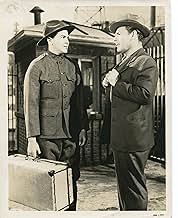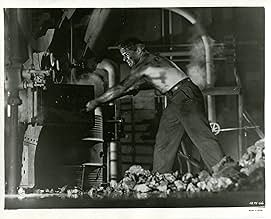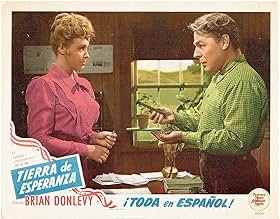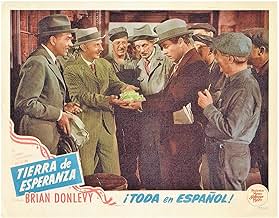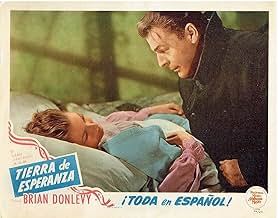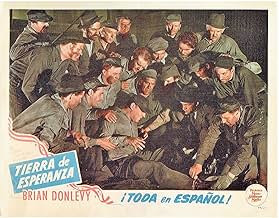Stefan Dangos emigra para a América e parte das minas de ferro e aço para se tornar uma grande história de sucesso americana como industrial.Stefan Dangos emigra para a América e parte das minas de ferro e aço para se tornar uma grande história de sucesso americana como industrial.Stefan Dangos emigra para a América e parte das minas de ferro e aço para se tornar uma grande história de sucesso americana como industrial.
- Direção
- Roteiristas
- Artistas
- Prêmios
- 2 vitórias no total
Stephen McNally
- Teddy Roosevelt Dangos
- (as Horace McNally)
- …
Ernie Adams
- Man and Dog Act
- (não creditado)
Erville Alderson
- Olson - Detroit Auto Works Technician
- (não creditado)
Fred Aldrich
- Assembly Line Worker
- (não creditado)
Axel Anderson
- Immigrant
- (não creditado)
King Baggot
- Graduation Ceremony Attendee
- (não creditado)
Charles Bates
- Teddy Roosevelt Dangos - Age 8
- (não creditado)
Barbara Bedford
- Hospitable Farm Woman
- (não creditado)
Arthur Belasco
- Drowsy Miner
- (não creditado)
Leon Belasco
- Cigar Store Proprietor
- (não creditado)
Art Berry Sr.
- Customs Man
- (não creditado)
Anna Marie Biggs
- Girl Soprano
- (não creditado)
Avaliações em destaque
Watching this film tonight and for the first time in about 40 years I also was seeing it in color for the first time and made me even more curious as to why no name stars were in the title roles with such an expensive production. From Robert Osborne I learned tonight that Spencer Tracy was originally going to be Steven Danglos instead of Brian Donlevy. Personally I would have waited for Tracy to become available and not because Donlevy gave a bad performance.
Donlevy's role is that of an Eastern European immigrant who starts work at a steel mill and by dint of his own hard work ethic rises to become a captain of industry. Along the way he woos and weds Ann Richards and they have a girl and four boys. A lot of immigrants did it that way and some are still doing it though many are illegal now. Back when we had virtually unlimited immigration because we wanted to grow the country a lot of stories like Donlevy's were possible although few rose to his heights. On both sides of my family that story could be told modified quite a bit.
In the end Donlevy is confronted with of all things labor management problems. He proves as stubborn as people like Henry Ford in that regard. If you remember in Citizen Kane a drunken Joseph Cotten tells off Orson Welles that something called organized labor is coming on the scene and what you gave your employees as largess is now thought of as their rights. Donlevy has the same paternalistic approach.
American Romance is also a tribute to the power of American industry which was growing to what we thought in 1944 as having unlimited potential. It was the backbone of our war effort and the last ten minutes without words show what Donlevy's Steven Danglos was a part of.
For reasons I think that no name star was in the lead, American Romance did not do that well. That's a pity because it's a fine film with wonderful cinematography which I finally saw on a color TV. Nice casting all around with such familiar folks as Walter Abel, John Qualen, and Stephen McNally. I hope TCM broadcasts it again soon.
Donlevy's role is that of an Eastern European immigrant who starts work at a steel mill and by dint of his own hard work ethic rises to become a captain of industry. Along the way he woos and weds Ann Richards and they have a girl and four boys. A lot of immigrants did it that way and some are still doing it though many are illegal now. Back when we had virtually unlimited immigration because we wanted to grow the country a lot of stories like Donlevy's were possible although few rose to his heights. On both sides of my family that story could be told modified quite a bit.
In the end Donlevy is confronted with of all things labor management problems. He proves as stubborn as people like Henry Ford in that regard. If you remember in Citizen Kane a drunken Joseph Cotten tells off Orson Welles that something called organized labor is coming on the scene and what you gave your employees as largess is now thought of as their rights. Donlevy has the same paternalistic approach.
American Romance is also a tribute to the power of American industry which was growing to what we thought in 1944 as having unlimited potential. It was the backbone of our war effort and the last ten minutes without words show what Donlevy's Steven Danglos was a part of.
For reasons I think that no name star was in the lead, American Romance did not do that well. That's a pity because it's a fine film with wonderful cinematography which I finally saw on a color TV. Nice casting all around with such familiar folks as Walter Abel, John Qualen, and Stephen McNally. I hope TCM broadcasts it again soon.
I saw this movie as a nine year old child and never forgot it. Later it appeared on television and more recently on TCM. I was impressed by the hero's fortitude in walking to Minnesota to join his cousin at the Mesabe Iron Range, his hard work, and his learning to read and eventually marrying the teacher. Each of his male children was named for a president after a friend remarked their child might reach that office. The movie taught me how iron ore was shipped east and processed into steel. Dangos also moves east and becomes a foreman. He eventually becomes an automobile manufacturer and his new ideas bring him success. His children succeed by achieving through the benefits of education. The movie ends after a documentary of American industry's contribution to the war effort. The Technicolor was gorgeous and Donlevy's performance believable. I still enjoy watching this film and believe King Vidor put his heart into it.
I taped this movie and just got around to watching it. As a senior, I was delighted to watch an old fashioned drama of bygone days and I thought Brian Donlevy did a great job. This man never got the recognition he deserved often cast in unfavorable roles. "An American Romance" gave him the opportunity to excel and he did a great job. I realize it is a Rags to Riches story and from the standpoint of contemporary society, a bit "corny", but it nonetheless had a message that hard work and dedication leads to success and happiness.
My only criticism is that it ended too abruptly. I did not watched the 151 minute version. T.C.M. showed a shorter version but I felt ending with world war II and building planes was a bit of a disappointment.
If you are looking for a film to show your grandchildren, this is it!
My only criticism is that it ended too abruptly. I did not watched the 151 minute version. T.C.M. showed a shorter version but I felt ending with world war II and building planes was a bit of a disappointment.
If you are looking for a film to show your grandchildren, this is it!
I saw this movie as a kid of 10 in Port Arthur, Texas, which had four theaters in a four block area. I don't remember all the details, but it was definitely a feel-good film. The protagonist was an Eastern European immigrant whose name was long and hard to pronounce, so he was re-christened Steve Dangos. Steve first got a job iron ore in an "op'm pit". Being bright and ambitious, he later became an automobile manufacturer and, if the movie is to be believed, was the first to build an enclosed sedan. He was proud to be an American (this was at a point in World War II when the outcome was expected but not guaranteed) and he named his sons after Washington and Theodore Roosevelt. He had his share of sorrow when one of the sons was killed in World War I. This was not one of the all-time film classics, but it must have made a great impression on me for the basic plot to have stayed with me for all these 62 years.
Wonderful shots of ca 1940 industry. The iron mine and ore docks were beautifully done, the open hearth and rolling mill was also great. Loved the Plymouths re-badged as "Dantons", apparently these were '41 leftovers as passenger car production was halted during the war. But the credits say the airplane factory was Douglas, some of the close ups of the Rosie the riveters may have been Douglas, but surely the B-17 line was at a Boeing plant? Or did Douglas also build B-17s?
But the drama was kind of corny. Not that immigrants didn't or couldn't become industrialists, but I don't think GMs steel turret tops cars could possibly have been invented in a backyard shed. In 1910 an innovative individual might have made a real improvement in auto production; by the thirties this could only have been done by a large industrial firm like GM with millions of dollars and hundreds of engineers.
But the drama was kind of corny. Not that immigrants didn't or couldn't become industrialists, but I don't think GMs steel turret tops cars could possibly have been invented in a backyard shed. In 1910 an innovative individual might have made a real improvement in auto production; by the thirties this could only have been done by a large industrial firm like GM with millions of dollars and hundreds of engineers.
Você sabia?
- CuriosidadesDuring World War II, there were no passenger car assembly lines in operation. As a result, Vidor had to borrow cars from Chrysler, take them apart and re-assemble them in a simulated assembly line. Seen emerging from the factory are 1942 Plymouths with a Danton insignia and hubcaps. These were the last passenger cars manufactured by Chrysler before the World War II shutdown.
- Erros de gravaçãoAs Steve Dangos closes his front door (after arriving home from the board meeting), a hand and lower arm can also be seen closing the door from the outside.
- Versões alternativasOriginal version premiered at 151 minutes; later cut to 122 minutes.
- Trilhas sonorasAmerica, My Country Tis of Thee
(1832) (uncredited)
Music by Lowell Mason, based on the Music by Henry Carey from "God Save the King" (1744)
Played during the opening credits
Reprised at the end
Principais escolhas
Faça login para avaliar e ver a lista de recomendações personalizadas
Detalhes
Bilheteria
- Orçamento
- US$ 3.000.000 (estimativa)
- Tempo de duração2 horas 31 minutos
- Proporção
- 1.37 : 1
Contribua para esta página
Sugerir uma alteração ou adicionar conteúdo ausente

Principal brecha
By what name was An American Romance (1944) officially released in India in English?
Responda
